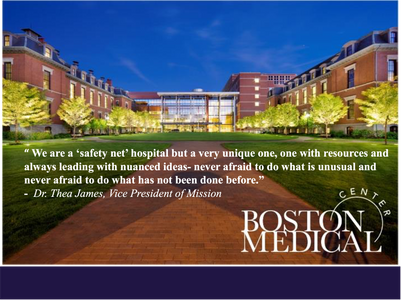Departmental Overview
The Department of Ophthalmology at Boston University Medical Center participates in and has responsibility for a broad range of clinical, research and teaching activities. Faculty members provide all levels of medical and surgical eye care in a wide range of locations in Massachusetts. These include one of Boston’s premier teaching hospitals, the Boston Medical Center (the private facility resulting from the merger of the Boston University Hospital and the Boston City Hospital), the Department of Veterans’ Affairs primary referral center for New England, the Boston Veterans Administration Healthcare System in Jamaica Plain and West Roxbury, a free-standing Ambulatory Surgical and Laser Refractive Center in Raynham, and the private offices of Boston University Eye Associates, Inc. in Boston, Taunton, Middleboro, and Brockton.
In addition to its clinical activities, the Department of Ophthalmology conducts a major research program in the Massachusetts Lions Eye Research Laboratory, the Harold S. Larkin Eye Research Laboratory, and The Larkin Family Eye Research Laboratory at the Boston University Chobanian & Avedisian School of Medicine. These endeavors seek to uncover the cause of blinding eye diseases and to develop new treatment modalities for these disorders.
In its Residency Training Program, the Department trains graduate physicians to be ophthalmologists and prepares them for certification by the American Board of Ophthalmology. The Department also provides advanced training for ophthalmologists in the subspecialty areas of 1) Retinal and Vitreous Diseases and Surgery, 2) Glaucoma. The Departmental faculty teaches medical students, residents, optometrists, primary care physicians and graduate students who are candidates for the Ph.D. degree.
The Boston University Medical Center draws from the fine traditions of its component institutions and facilitates their missions of providing high-quality tertiary care patient services as well as unparalleled primary medical care; of ensuring excellent training opportunities and supervision of future physicians; of adding to medical knowledge and to the practitioner’s armamentarium through advances in medical research; and of safeguarding the unique ability of this institution to provide needed medical services for all. The Department of Ophthalmology is a major part of that mission.
